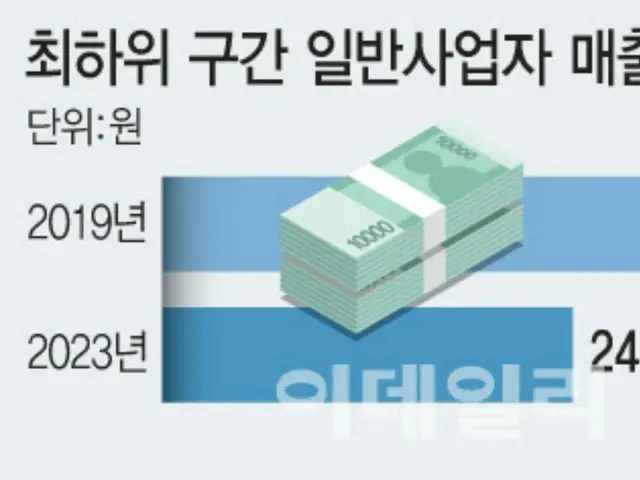"When it gets dark, the customers stop coming and the only thing left to do is close the store," said Lim, who runs a restaurant in the market in Ansan, Gyeonggi Province.
It was found that a considerable number of food and beverage operators have not been able to recover sales levels to those before the COVID-19 outbreak. However, sales at large operators have increased, exacerbating polarization.
According to a document on the food and beverage industry by value-added tax filing size received by Park Sung Hoon, a member of the National Assembly's Planning and Finance Committee, from the National Tax Service on the 21st, the restaurant business is in the lowest sales range.
In 2023, there will be 96,539 general business operators with incomes of less than 30 million won (3.28 million yen), accounting for 17.3% of all business operators. The average sales revenue of these businesses will be 24.3 million won (about 2
660,000 won), a 19.3% decrease from 30.1 million won (about 3.3 million yen) in 2019. Over the past four years, monthly sales have dropped from 2.5 million won (about 273,000 yen) to 2 million won (about
On the other hand, the average sales of general businesses in the top tier, whose VAT reporting scale reaches 2 billion won (about 218 million yen), increased.
It was found that 285 people made an average of 5.8298 billion won (US$6.37 million) in sales last year. This is up from the average of 5.5534 billion won (US$6.77 million) four years ago.
The number of simplified businesses with VAT declared amounts of 3 million won (US$3,000) or less is expected to be 36,950 in 2023, with average sales of 600,000 won.
(about 65,600 won). This is less than 800,000 won (about 87,500 yen) four years ago.
The average sales amount for the top tier, which hit 72 million won (US$70,000) in 2023, also fell. It is expected to reach 148.3 million won (US$150,000) in 2023, down from 152.5 million won (US$160,000) four years ago.
The gap between rich and poor is becoming more evident among corporations. Corporations whose declared VAT amount is less than 50 million won (approximately 5.46 million yen)
The number of such people in 2023 was 8,680, accounting for 27.1% of the total, with an average sales amount of 29.8 million won (approximately 3.26 million yen). In 2019, before the spread of the COVID-19 virus, the average sales amount was 29.8 million won (approximately 3.26 million yen).
The upper limit was 31.1 million won (approximately 3.4 million yen), but since then it has not been able to exceed the 30 million won (approximately 3.28 million yen) range.
In comparison, corporations that declare value-added tax of 50 billion won or more (approximately 5.46 billion yen)
The number of stores was 25, with average sales reaching 462.86 billion won (US$470 million), up 11.2% from the average sales of 416.25 billion won (US$430 million) four years ago.
The average sales of these corporations, which account for the top 0.1%, is expected to grow from 410 billion won (US$437 million) in 2019 to 360 billion won (US$377 million) in 2020 and 340 billion won (US$437 million) in 2021.
However, as the COVID-19 virus progresses toward an endemic state, it is showing signs of rapid recovery.
This is analyzed as a result of the clear difference in resilience caused by a serious crisis such as the COVID-19 virus.
Rep. Park Sung Hoon said, "The slowdown in domestic demand due to high interest rates and rising prices is exacerbating the polarization of income among self-employed people."
"We need support and policies to combat this," he said.
2024/10/22 07:09 KST
Copyrights(C) Edaily wowkorea.jp 107

